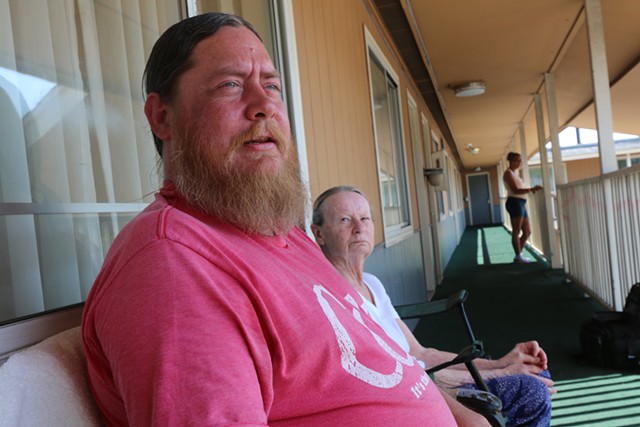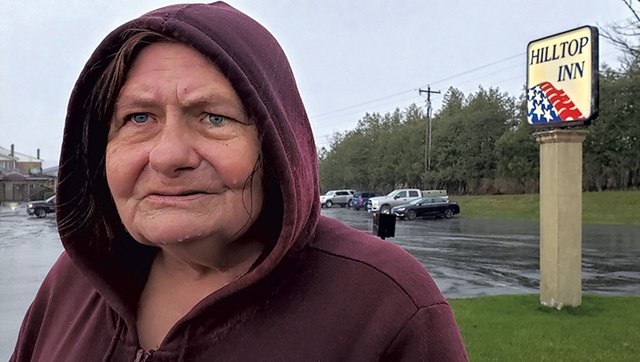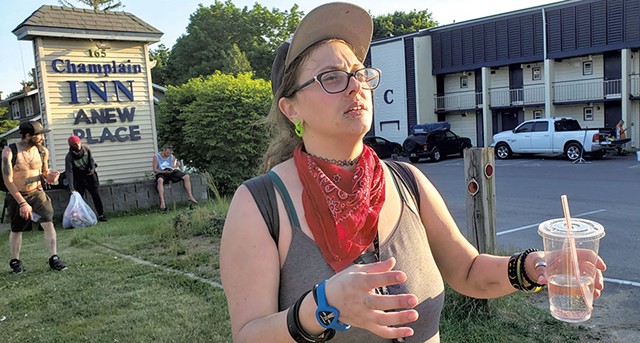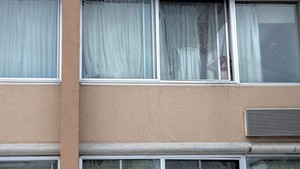
- Kevin McCallum ©️ Seven Days
- Russell Blithe and Alberta Deavitt at the Travelodge in South Burlington in May.
A deal to prevent the evictions of an estimated 2,000 homeless people from motels around Vermont is taking shape and will be considered by lawmakers during this week’s veto session.
Legislative leaders have been crafting a new bill to appease about 20 Democratic and Progressive lawmakers who disagree with the way the pandemic-era motel housing program is ending.
The rebel lawmakers are putting pressure on House and Senate leaders to prevent more mass evictions, which began June 1 for about 800 people and loom beginning July 1 for 2,000 considered more vulnerable.
The deal being hammered out ahead of Tuesday’s veto session is intended to prevent the Vermont Agency of Human Services from kicking more people out of their motel rooms until other shelter is found for them.
The pause on evictions would be until April 1, 2024. In the interim, the bill seeks "an intentional transition process that provides dignity, oversight, collaborative efforts, and coordinated service delivery," according to a draft of the bill, H. 171, obtained by Seven Days.
The state would, however, no longer be required to pay for people to remain in motels if other beds were found for them in shelters, residential treatment facilities, recovery homes, nursing homes, permanent housing or with family. People would have 48 hours to leave their motels once new arrangements could be made for them.
The bill would require the state to renegotiate the price of hotel rooms down to about half of the $147 per night that they average now. Some motel owners have expressed a willingness to reduce their rates, but it’s not clear how many would continue offering rooms under such discounts.
Legislative leaders have been crafting a new bill to appease about 20 Democratic and Progressive lawmakers who disagree with the way the pandemic-era motel housing program is ending.
The rebel lawmakers are putting pressure on House and Senate leaders to prevent more mass evictions, which began June 1 for about 800 people and loom beginning July 1 for 2,000 considered more vulnerable.
The deal being hammered out ahead of Tuesday’s veto session is intended to prevent the Vermont Agency of Human Services from kicking more people out of their motel rooms until other shelter is found for them.
The pause on evictions would be until April 1, 2024. In the interim, the bill seeks "an intentional transition process that provides dignity, oversight, collaborative efforts, and coordinated service delivery," according to a draft of the bill, H. 171, obtained by Seven Days.
The state would, however, no longer be required to pay for people to remain in motels if other beds were found for them in shelters, residential treatment facilities, recovery homes, nursing homes, permanent housing or with family. People would have 48 hours to leave their motels once new arrangements could be made for them.
The bill would require the state to renegotiate the price of hotel rooms down to about half of the $147 per night that they average now. Some motel owners have expressed a willingness to reduce their rates, but it’s not clear how many would continue offering rooms under such discounts.

- Kevin Mccallum ©️ Seven Days
- Vicki Mindle
The funding — how much is unknown — would come from unused Agency of Human Services appropriations, plus any surplus in an account established to invest in infrastructure and reduce debt from capital projects.
Some of the money already allocated in the budget would also be redirected to prioritize people leaving motels. For example, of the $40 million set aside for the Vermont Housing & Conservation Board for affordable housing, the bill calls for $10 million to be invested in mobile home parks with available spaces.
Some of the money already allocated in the budget would also be redirected to prioritize people leaving motels. For example, of the $40 million set aside for the Vermont Housing & Conservation Board for affordable housing, the bill calls for $10 million to be invested in mobile home parks with available spaces.
The bill also would increase legislative oversight during the new transition period. The administration would need to make detailed monthly updates to key legislative committees about the progress being made transitioning people out of the program.

- Kevin Mccallum ©️ Seven Days
- Natasha Doolan
Reports would also need to include a monthly tally of emergency shelter beds available in different parts of the state, the status of efforts to increase those beds and an estimate of how long it would take to transition the remaining people in the program.
The state has said many of those leaving the program on July 1 might qualify for 28- or 84-day extensions of housing benefits under the rebooted general assistance program.
Much of the funding aimed at expanding homeless services, however, is contained in the budget and would be held up by a protracted budget battle.
Brenda Siegel, an advocate for homeless people, has argued that the state has an obligation to also offer shelter to those it has already evicted. Many have medical conditions or other threats to their health, safety and recovery that didn't qualify them for the extension to July 1, she said.
Siegel said she personally witnessed people with acute medical conditions forced onto the street on June 1 who didn't qualify as "disabled" because they weren't receiving Social Security disability benefits. She blamed bias against poor people and an unspoken belief that their troubles are often self-imposed, she said.
"It's time for people in power to reflect on what made this OK with them," she said.











Comments
Comments are closed.
From 2014-2020, Seven Days allowed readers to comment on all stories posted on our website. While we've appreciated the suggestions and insights, right now Seven Days is prioritizing our core mission — producing high-quality, responsible local journalism — over moderating online debates between readers.
To criticize, correct or praise our reporting, please send us a letter to the editor or send us a tip. We’ll check it out and report the results.
Online comments may return when we have better tech tools for managing them. Thanks for reading.